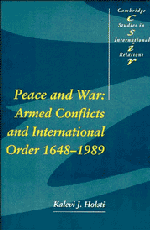Book contents
- Frontmatter
- Contents
- List of figures
- List of tables
- Preface
- 1 ON THE STUDY OF WAR
- 2 MÜNSTER AND OSNABRÜCK, 1648: PEACE BY PIECES
- 3 WAR AND PEACE IN THE ERA OF THE HEROIC WARRIORS, 1648–1713
- 4 ACT TWO OF THE HEGEMONY DRAMA: THE UTRECHT SETTLEMENTS
- 5 THE LETHAL MINUET: WAR AND PEACE AMONG THE PRINCES OF CHRISTENDOM, 1715–1814
- 6 PEACE THROUGH EQUILIBRIUM: THE SETTLEMENTS OF 1814–1815
- 7 CONFLICT AND CONSENT, 1815–1914
- 8 1919: PEACE THROUGH DEMOCRACY AND COVENANT
- 9 WAR AS THE AFTERMATH OF PEACE: INTERNATIONAL CONFLICT, 1918–1941
- 10 PEACE BY POLICING
- 11 THE DIVERSIFICATION OF WARFARE: ISSUES AND ATTITUDES IN THE CONTEMPORARY INTERNATIONAL SYSTEM
- 12 WAR: ISSUES, ATTITUDES, AND EXPLANATIONS
- 13 THE PEACEMAKERS: ISSUES AND INTERNATIONAL ORDER
- References
- Additional data sources
- Index
5 - THE LETHAL MINUET: WAR AND PEACE AMONG THE PRINCES OF CHRISTENDOM, 1715–1814
Published online by Cambridge University Press: 04 February 2011
- Frontmatter
- Contents
- List of figures
- List of tables
- Preface
- 1 ON THE STUDY OF WAR
- 2 MÜNSTER AND OSNABRÜCK, 1648: PEACE BY PIECES
- 3 WAR AND PEACE IN THE ERA OF THE HEROIC WARRIORS, 1648–1713
- 4 ACT TWO OF THE HEGEMONY DRAMA: THE UTRECHT SETTLEMENTS
- 5 THE LETHAL MINUET: WAR AND PEACE AMONG THE PRINCES OF CHRISTENDOM, 1715–1814
- 6 PEACE THROUGH EQUILIBRIUM: THE SETTLEMENTS OF 1814–1815
- 7 CONFLICT AND CONSENT, 1815–1914
- 8 1919: PEACE THROUGH DEMOCRACY AND COVENANT
- 9 WAR AS THE AFTERMATH OF PEACE: INTERNATIONAL CONFLICT, 1918–1941
- 10 PEACE BY POLICING
- 11 THE DIVERSIFICATION OF WARFARE: ISSUES AND ATTITUDES IN THE CONTEMPORARY INTERNATIONAL SYSTEM
- 12 WAR: ISSUES, ATTITUDES, AND EXPLANATIONS
- 13 THE PEACEMAKERS: ISSUES AND INTERNATIONAL ORDER
- References
- Additional data sources
- Index
Summary
It is certainly a remarkable occurrence, that in the course of three most eventful centuries, amid so many bloody wars, so various and decisive negotiations, so frequent changes of power …, amid a general anarchy of all social, civil, religious, and political relations, not one independent state was annihilated by violent means.
Emmerich de VattelPowerful sovereigns succeed only too often in winning for themselves partisans and allies who are blindly devoted to their designs. Dazzled by the glitter of a present advantage, seduced by their greed, deceived by unfaithful ministers, how many princes become the instruments of a power which will one day swallow up either themselves or their successors.
Friedrich von GentzThe War of the Spanish Succession did not suggest that something may have been wrong with the structure, actors, or processes of the new system. Quite the contrary: it demonstrated that it was working very well. The international problem of the late seventeenth and early eighteenth century was not war. It was hegemony, Louis's version of the old drive for domination that had animated Charles V and the Spanish imperialists. It was the success of the system in solving that problem, via the operation of the balance of power, that helps account for the absence of concern about the problem of war.
- Type
- Chapter
- Information
- Peace and WarArmed Conflicts and International Order, 1648–1989, pp. 83 - 113Publisher: Cambridge University PressPrint publication year: 1991



